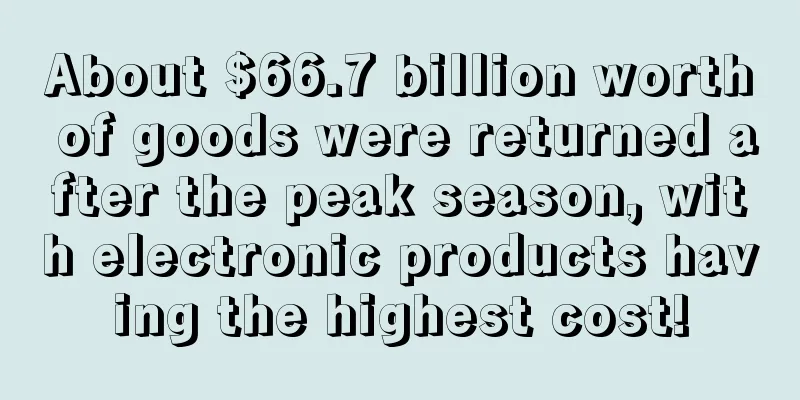About $66.7 billion worth of goods were returned after the peak season, with electronic products having the highest cost!

|
In order to stimulate sales, many online retailers have provided free return services to attract more consumers to choose to shop in their stores during peak seasons.
But this "free" means more costs for retailers. In fact, according to logistics forecasts, due to severe inflation, labor shortages and epidemic prevention measures, the cost of returns will increase during this holiday peak season.
The cost of returns this holiday season will cost two-thirds of the original price of the item, taking into account labor, shipping and warehousing costs, according to a joint survey by commercial real estate firm CBRE and retail services company Optoro .
The National Retail Federation expects online sales to increase 13% in November and December to more than $222 billion, but CBRE 's report predicts that $66.7 billion in returns will be generated , a 13% year-on-year increase.
exist Optoro 's annual report said that the cost of returns increased by 7%. Among them, the return cost of electronic products such as computers, tablets and mobile devices is 15 times higher than that of clothing because staff also need to delete personal data from the devices.
Optoro 's founder said: "The number of people buying electronic products during the peak season is increasing, but this also means that the number of people returning products is also increasing. In order to ensure the security of these products, merchants must delete the relevant data of returned products, which adds more workload."
Online shopping has shown its advantages of relative safety and convenience during the epidemic. However, compared with physical stores, the inability to touch the real thing has become its biggest disadvantage. Therefore, the emergence of free return services allows consumers to find a shopping experience similar to that of physical stores.
According to the survey, the return rate this year is 46% higher than the average level of the previous five years . The return rate for online purchases is 30%, while the rate for physical sales is 10%.
Affected by the shortage crisis this year, 41% of consumers decided to shop in advance, which also prolonged the return cycle. Especially for large retailers such as Walmart, Target, and Best Buy, while sales increased, they also faced rising logistics costs. The logistics costs of such large retailers accounted for 12% of sales , while traditional retailers only accounted for 6%.
In addition, the wages of logistics workers increased by 5% during the epidemic , and retailers needed to increase warehouse space by 20% to handle returned goods. This increased cost also put many retailers under great pressure.
In addition, the report also pointed out that returns are also an environmental issue. Because more packaging is generated when returning goods, it is estimated that after the holiday season, 5.8 billion tons of returned packaging will be landfilled, and the packaging generated by returns will also generate about 16 million tons of carbon dioxide.
Free returns are indeed one of the ways to stimulate sales and establish a good reputation for the store. However, how to find a balance between increased costs and increased sales is also the next issue that online retailers need to consider. return the goods Electronics |
<<: Reaching 100 billion US dollars! Overseas beauty market has broad prospects
Recommend
What is Global Bees? Global Bees Review, Features
Global Bees , which focuses on acquiring, consolid...
What is btf-lighting? btf-lighting Review, Features
btf-lighting specializes in the production of LED ...
Cross-border people show off their annual leave, some companies give 23 days!
At the beginning of the new year, some Amazon sel...
"Marilyn Monroe" patted you on the back: 300+ accounts sued, these words can no longer be used!
The halo of celebrity can certainly bring exposur...
What is Unai Testing? Unai Testing Review, Features
Established in 2012, Younai Testing is an independ...
Sales reached $90 billion! Personal care products will continue to be popular
Did you catch the traffic boom on Valentine's...
About 94% of Germans choose Amazon for online shopping
July 7 news, according to foreign media reports, ...
What is Shenzhen Atomobi Mobile Technology Co., Ltd.? Shenzhen Atomobi Mobile Technology Co., Ltd. Review, Features
Shenzhen Atomobi Mobile Technology Co., Ltd. (Ato...
What is Plae? Plae Review, Features
Plae is a technology-driven children's lifest...
A comprehensive review! Top ten news of cross-border e-commerce in 2023!
The melody of global business is coming towards u...
The mainstream of US e-commerce will change! 62% of American consumers choose DTC brands
In recent years, DTC brands have developed rapidl...
How can DTC clothing brands go global and win over the younger generation of consumers by handling the six major payment links?
In the past two years, under the dual influence o...
US truckers plan to strike, millions of packages may be stranded
Amazon has been considering expanding its logisti...
Demand surges 200%! Second-hand products are a big hit in India
After the outbreak of the epidemic, Indian people...
The loss of 2.7 billion narrowed to 300 million, and the pain of Youkeshu’s account being banned gradually faded!
The Spring Festival holiday is over. Some people ...









